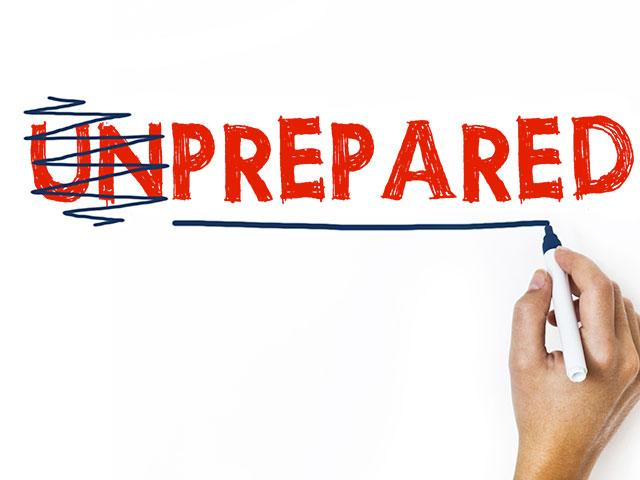
Have you ever wished you were better prepared for something? Like an extended power or water outage? A backup of your computer files? Or a shortage of toilet paper at the store? How about losing your job? As we become increasingly dependent on everything and everyone, people often find themselves wishing they were better prepared. It seems too often that we say “I wish I had known about this ahead of time. I would have been better prepared.”
But is being prepared worth the cost and effort? Does it really make sense to give attention to those rare but potentially devastating unplanned circumstances? Should we allocate our precious time and money to contingency planning, backups, and maintaining spares? Or is the time and cost of being prepared not sufficiently outweighed by the inconvenience of whatever might happen? Should we just learn to be agile and accommodating?
Some people make the choice to prepare. Some go to extreme levels. Preppers, as they are called, are ready to survive virtually any catastrophe. They have enough food to last for several weeks if not months. They install underground bunkers. They have generators, solar panels, or wind turbines available to provide power should there be a power outage. They have cash, first aid, and other supplies stored away for use or barter when the need arises.
How prepared are you for the unexpected? What if you develop a long-term illness or experience a pandemic? Or encounter an economic depression, stock market collapse, devastating weather event, or fire? Or become the victim of identity theft or a ransomware attack? A prolonged power or water outage? Do you have an alternative source of power or drinkable water? Do you have spares and back-ups? Contingency plans? Extra money? Agreements in place with people who can help you? Manual back-ups when your electronics fail? A way to stay informed should the Internet and public telecommunication system go down?
The odds may be low that you will encounter any single unforeseen event such as these, but over the course of your life you will encounter them. When you do, will you wish you would have been better prepared? If so, in what areas might you need to be prepared? Not to be an alarmist, but perhaps you, your family, and coworkers should allocate some time to discussing and planning for unforeseen events.
Here are a few areas to consider and discuss:
Plans:
- Legal – wills, estate plans, powers of attorney
- Insurance – life, auto, home, property, business, liability
- Succession plans for key employees and positions
- Contingency plans to execute when pre-determined triggers or thresholds are crossed
- Supplier agreements with terms and conditions for buying, returning, or postponing purchases
- Agreement with family, friends, and colleagues on how to communicate and where to meet if telecommunication networks fail
- Agreement with partners, friends, or others on key resources to share
- Documented processes and procedures, particularly those in people’s heads not yet documented
- Storage of valuables
Backups:
- Computer and phone data
- Scanned images of paper-based contracts, records, and other important documents
- Pictures, videos, music
Skills:
- Core job skills – skills you might currently outsource to others
- Do-it-yourself abilities – auto repair, home repair, construction
- Survival – camping, hunting, fishing, self-defense
Sustenance:
- Food – canned goods with extended expiration dates, can opener, pasta, rice, beans, dehydrated foods, dried fruits, drink mixes, nuts, snacks, oils, grains, flour, sugar, baking powder, corn meal, oats, cereal, spices, pet food
- Water – bottled water, purification tablets
- Basic necessities – eyeglasses, soap, lotion, personal hygiene items, flash lights, candles, toilet paper, lighter, matches, plastic bags
- Clothing – pants, shirts, socks, underwear, shoes, gloves, coats, boots, waders
- Shelter – camper, bunker, tents, blankets, portable heater, wood, lighter fluid, charcoal, pots, pans, cups, plates, utensils
- Information – “how to” reference guides, books, bibles, AM/FM radio, amateur “ham” radio
- Money – savings, investments, cash
- Power – batteries, solar panels, generator, fuel, wind turbine
- Tools – basic hand tools, gardening tools, specialized tools
- Parts – spare parts for critical systems and equipment, glue, tape, wire, rope, miscellaneous hardware
- Transportation – bicycle, motorcycle, inflatable raft, trailer
- Safety and medical – medicine, vitamins, first aid items, hydrogen peroxide, alcohol, oxygen, gas masks, helmets, googles
- Fishing, hunting, gardening – fishing gear, hunting gear, vegetable plants and seeds
- Fun and games – books, balls, playing cards, dominoes, board games, liquor
Download PDF Version
Article by Mike Hawkins, award-winning author of Activating Your Ambition: A Guide to Coaching the Best Out of Yourself and Others (www.ActivatingYourAmbition.com), author of the SCOPE of Leadership six-book series on coaching leaders to lead as coaches (www.ScopeOfLeadership.com), and president of Alpine Link Corp (www.AlpineLink.com), a boutique consulting firm specializing in leadership development and sales performance improvement. For other articles on reaching your peak potential, visit: www.alpinelink.com/blog
